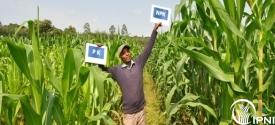Taking Maize Agronomy to Scale in Africa
The TAMASA program aims to use geo-spatial agronomic data and modern analytics to co-generate approaches with extension service providers for transforming agronomic research and delivery services for smallholder farmers in maize based systems in sub-Saharan Africa
Maize yield has remained low, on average 2 t ha-1 season-1 in Sub-Saharan Africa despite the increasing demands for both maize grain and stover to meet the growing human population and livestock feed, respectively. The impact of programs by governments, development agencies and private sectors to support smallholder farmers to intensify maize production in a profitable manner at larger spatial scales is often limited by lack of resources and decision support tools, especially to develop fertilizer recommendations that are suitable for variable soil and climatic conditions, as well as social economic circumstances of farmers. It is against this backdrop that Bill and Melinda Gates Foundation funded a four year project on Taking Maize Agronomy to Scale in Africa (TAMASA) with an initial focus on three countries, Ethiopia, Nigeria and Tanzania. This project aims to use geospatial agronomic data and modern analytics to co-generate approaches with extension service providers for transforming agronomic research and delivery services for smallholder farmers in maize-based systems in sub-Saharan Africa. The TAMASA project is adapting the Site-Specific Nutrient Management (SSNM) approach through a simple but robust nutrient management decision support tool, the Nutrient Expert (NE). The Nutrient Expert tool uses SSNM to develop strategies to manage fertilizer Nitrogen (N), Phosphorous (P), and Potassium (K) taking into account nutrients from both indigenous sources and mineral fertilizers. IPNI together with extension service providers will therefore co-develop regional nutrient recommendation spatial frameworks and related suitable extension products using the Nutrient Expert, to enable service providers to provide farmers with fertilizer recommendations tailored to a specific field or farm or growing environment.
 Nutrient Expert for improved fertilizer recommendations for maize in sub Saharan Africa
Nutrient Expert for improved fertilizer recommendations for maize in sub Saharan AfricaThe Nutrient Expert (NE) decision support tool has been successfully adapted for use in developing fertilizer recommendations that address wide diversity of soil and climatic conditions in Ethiopia, N ...
